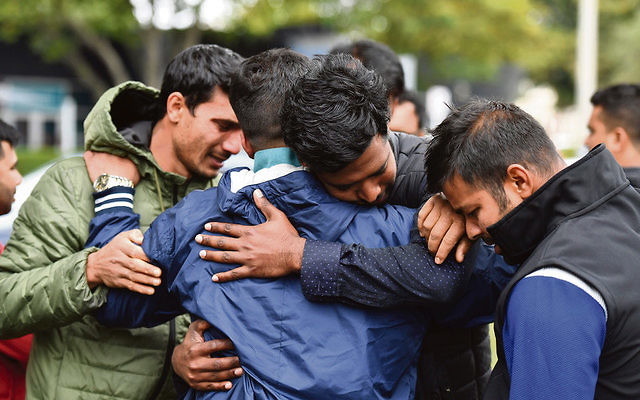‘Our hearts cry out. We are all the children of Abraham’
WHEN a gunman opened fire on Muslim men, women and children in prayer in Christchurch on March 15, killing 50, it had a monumental impact on the whole of New Zealand, the full extent of which still remains to be seen.

WHEN a gunman opened fire on Muslim men, women and children in prayer in Christchurch on March 15, killing 50, it had a monumental impact on the whole of New Zealand, the full extent of which still remains to be seen. New Zealanders are still reeling and coming to terms with the reality that such an atrocity was able to happen here.
New Zealand Jews were quick to express their horror and sorrow at the events in Christchurch.
The New Zealand Jewish Council spoke for many when it said that it had “no adequate words to describe how sickened and devastated” it was, offering full assistance and support to the Muslim community, and standing united with it against terror and racism.
A few days later, Rabbi Natti Friedler and Rabbi Ariel Tal from the Auckland and Wellington Orthodox communities wrote to the imams of the mosques that had been attacked, expressing sympathy and solidarity with the Muslim community, and declaring that, “An attack on a mosque is an attack on a synagogue.” They continued, “Our hearts cry out and we mourn with your families … We are all the children of Abraham; we commit to fighting darkness by adding more light to the world.”
Rabbis and representatives of the New Zealand Jewish Council have travelled to Christchurch to meet with leaders of the Muslim community, offer their respects and to find ways in which the Jewish community might be able to support those affected by the attacks.
There is a great deal of enthusiasm among the Jewish community, both in New Zealand and internationally, in providing support to the families of the victims.
Amid the grief and horror that a minority group was targeted in such a way in New Zealand, there is the sense that it could have easily been the Jewish community that was attacked. It is early days, but Jews are now processing the security implications for their own community.
In an unprecedented move, synagogue services across the country were cancelled last Shabbat on advice from the New Zealand police. Kadimah School – New Zealand’s only Jewish day school – was kept closed on Monday as a precaution. It reopened on Tuesday with a police presence.
Questions are being raised in the media around how much intelligence agencies knew, or should have known, about the risks presented by white supremacist activity in New Zealand, and also how seriously – or otherwise – such risks were taken. Prime Minister Jacinda Ardern has now announced a commission of inquiry to look into these questions.
Muslim community leaders have been scathing of the lack of response by government and agencies to their appeals for action on rising racism and the alt-right. Former race relations commissioner Dame Susan Devoy was similarly critical, calling officials’ response “diabolical”.
“I’d be asking our government, what is our countering violent extremism strategy? Because one of the pillars of that is to engage with your community. And I would think we have failed on that count.
“I can assure you, it wasn’t just the Muslim community, the Jewish community also felt at threat.”
As details unfold from investigations into the attack and the commission of inquiry, New Zealand Jews will be watching keenly and looking to the government and agencies for reassurance that risks to targeted minority groups are being properly assessed and mitigated.
The Christchurch attack has also been an awakening for many New Zealanders who believed that racism and intolerance were not New Zealand problems. For many Jews it has highlighted the distance between two communities that face similar challenges. A desire to engage with the Muslim community, to build understanding and fellowship appears to be emerging, with several initiatives already being mooted.
It is too early to say what long-term impact on Jews in New Zealand the events in Christchurch will have.
This week, a media story – uncomfortably conspiratorial in tone – was published connecting the Christchurch gunman with Israel. If this story develops it risks feeding an already feverishly anti-Israel social media environment, which easily morphs into antisemitism.
For all those currently in New Zealand, these are unfamiliarly dark days in our otherwise serene, quiet country of 4.8 million people.
Shoshana Maasland is a member of the executive of the New Zealand Jewish Council.

comments